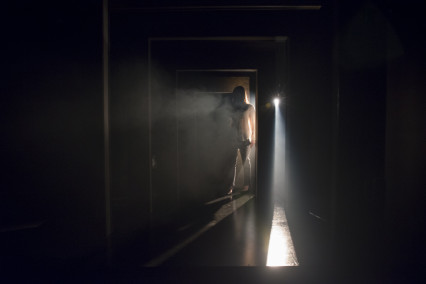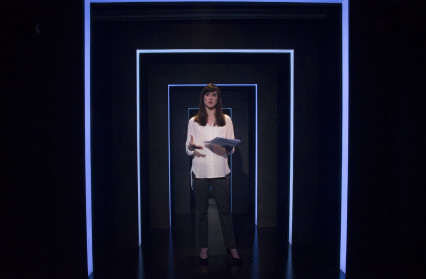Elin Williams casts a critical eye over The Other Room’s production of Nick Gill’s Sand starring Sara Lloyd Gregory and directed by Kate Wasserberg.
The Other Room have enjoyed massive success recently. They are one of a number of companies in Wales who produce provocative and innovative pieces with a limited budget. The tiny side room in Porters is their home, where they stage some of the best pieces of original writing in Wales.
Sand is no exception. Written by Nick Gill, the forty minute monologue is mesmerising, with thoughtful direction from Kate Wasserberg and a jaw-dropping performance by Sara Lloyd Gregory. Set on the bare stage, Sand is all about the writing. It is complex, clever and chaotic. The apocalyptic themes are complemented perfectly by Amy Jane Cook’s minimalist set: a doorway with neon lighting.

The story begins with a boy on the swing, the image strong in the minds of the audience thanks to Gill’s detailed sensory description. Punctuated by significant dates throughout history, the slow burn realisation that this is a monologue about the perils of the atomic bomb begins to dawn on us. This development is at the core of the narrative, moving throughout history, always coming back to a scientist presenting a lecture on testing a nuclear device. The nameless female moves swiftly through dates from the First and Second World War before moving onto modern day. This is delivered perfectly by Gregory, who ranges from cold and heartless to hysterical and confused. In fact, it is Gregory’s performance that is key to understanding what is going on. Gill’s description of a scene in which we eventually come back to that boy on a swing in the midst of a nuclear bomb attack is terrifying. The boy faces away from the woman as she watches, helpless, from a distance. She watches as the black sand travels towards her, the only thing left. Gregory begins to frantically rush through the instructions for the public, perfectly replicating the panic one might feel if in that situation. Her performance verges on the hysterical, but cleverly avoids descending into utter hysteria.
The piece ultimately makes us question what we, as the human race, are capable of. When do we stop? Can we stop? Will we ever stop? There is a certain feel of Shelley’s Frankenstein about it; the danger of experimenting with science, chemistry, physics: is it all in the name of progression or ethically are we regressing? If the end product has the potential to annihilate the Earth, does that make us more in control, or by such things existing, is the control slipping from our grasp?
These questions are the reasons this monologue is so great. If a piece doesn’t raise as many questions as this, are we gaining anything by watching it? This thought provoking monologue will leave you feeling impressed, inquisitive and confused. Another fantastic piece of original work from The Other Room.
Find out more about The Other Room’s upcoming productions on their website.
Elin Williams is a writer and contributor to Wales Arts Review.
(Image credits: Aenna Pallasca)












